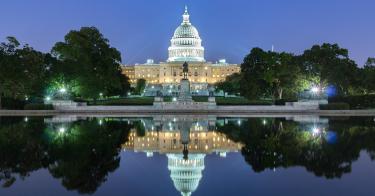Why would a Republican House, a Republican Senate and a Republican president repeal the best weapon against runaway federal spending in 30 years?
That may happen later this year if Congress doesn't extend the Budget Control Act of 2011, which includes spending caps and sequester spending cuts if those caps are violated. The BCA has been one of the most successful anti-spending policies of modern times, and it helped bring the spending blitz during Barack Obama's first two years in office to a screeching halt.
After the budget caps were installed, federal spending fell for three years in a row — the first time that had happened since the 1950s, despite the most liberal, pro-spending president since Lyndon Johnson, Barack Obama. Even the much-maligned sequester cuts of 2013 had a positive effect in cutting government domestic and defense spending by 3 or 4% across the board. Most Americans hardly noticed these modest cuts.
Both parties have come to hate budget caps and the threat of sequesters. There has always been a bipartisan urge on Capitol Hill to play Santa Claus, no more so than now. Republicans complain of the Pentagon cuts and Democrats object to the domestic-agency reductions. This is why since 2015 Congress keeps raising or suspending the caps with impunity.
Now Republicans want to scrap caps completely and return to the wild West of spending. Democrats are all too happy to go along. If this happens, you can toss all remaining dreams of spending discipline out the window. The debt will accelerate if there are no spending guard rails. To borrow a phrase from P.J. O'Rourke: This would be about as wise as handing a teenager the car keys and a bottle of booze.
So the BCA caps and sequesters need to be retained. They also need to be fixed. Three sensible changes would improve and modernize the law:
1) Remove the defense/non-defense "firewall." If Congress removes the firewall between defense and non-defense spending and imposes one overall cap, lawmakers will have more flexibility in staying under the cap each year.
2) Repeal sequestration exemptions. If a sequester kicks in, cuts should apply equally to all programs, including Medicaid, Medicare and food stamps. This would spread the pain more equally if sequester cuts are necessary.
3) Prohibit gimmicks, such as "emergency" spending exemptions to breach the caps. This year Congress has approved roughly $50 billion for hurricane relief — with no cuts in other programs to offset the cost. The Overseas Contingency Operation also has been used as a slush fund to spend an extra half-trillion on the military. This should stop immediately.
Too many in Congress want to be unleashed from the BCA spending limits, while they hypocritically bemoan our $20 trillion national debt. That debt is expected to spiral to $30 trillion by 2030, and our debt as a share of GDP heads to 150%. That is Greece and Detroit territory.
If Congress can restrain spending to 2.5% annual growth (which is less than the rate of inflation) and keep the economy on a 3% growth path, up from 2% under Obama, the budget will be balanced with the Trump tax cuts.
If they scrap the caps, the only party to blame for the coming spending and debt blowout will be the late, great fiscally conservative Republicans.
This piece originally appeared in Investors Business Daily



